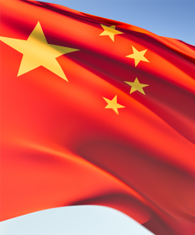 The head of China’s sovereign wealth fund has cut his holdings in Europe. Lou Jiwei, chairman of China Investment Corporation (CIC), said: “There is a risk that the Eurozone may fall apart and that risk is rising.” Beijing has been increasingly concerned that the crisis in Europe — its biggest export market — may damage China’s growth prospects. Mr Lou told The Wall Street Journal that CIC, which manages 410 billion dollars of assets, had sold its exposure to peripheral Eurozone countries “a long time ago” and slashed its holdings of European stocks and bonds. “There is too much risk in Europe’s public markets,” he said, according to The Times.
The head of China’s sovereign wealth fund has cut his holdings in Europe. Lou Jiwei, chairman of China Investment Corporation (CIC), said: “There is a risk that the Eurozone may fall apart and that risk is rising.” Beijing has been increasingly concerned that the crisis in Europe — its biggest export market — may damage China’s growth prospects. Mr Lou told The Wall Street Journal that CIC, which manages 410 billion dollars of assets, had sold its exposure to peripheral Eurozone countries “a long time ago” and slashed its holdings of European stocks and bonds. “There is too much risk in Europe’s public markets,” he said, according to The Times.
Marks & Spencer is to open its first bank branch, making current accounts available alongside sandwiches, socks and cashmere sweaters. The retailer will on Friday announce plans to open an in-branch banking service in its Marble Arch flagship store in London, with plans to expand the service to 50 larger outlets across the country by the end of the year. Mortgages will not be offered initially, however the retailer expects to extend the range of services it provides, which will start with current accounts, to include home loans. The opening of the branch will mark an escalation in the retailer’s plans to take on Britain’s established high street lenders and will see it go head-to-head against the likes of Barclays and Lloyds TSB, The Telegraph reports.
Banks will be allowed to fail under plans unveiled by the European Commission as a way to help solve the crisis in the Eurozone. Proposals aimed at breaking the “too big to fail” culture in the European banking sector were unveiled yesterday, but analysts warned the plans may come too late to save Spain’s troubled banks. Under the commission’s plans, banks that posed no systemic risk to the national or international economy would simply be allowed to close. However, those whose failure would pose too grave a threat to the stability of financial markets would be propped up in part by having unsecured creditors of the bank, such as bondholders and shareholders, take losses rather than having taxpayers give the institution rescue money, The Scotsman explains.
A serious mishandling of the debt crisis by European leaders led Fitch to axe Spain’s credit rating by three notches and issue a warning on the stability of country’s banks, debt levels and economy. In a report that will be embarrassing for Berlin and Brussels, the credit rating agency said “policy mis-steps at the European level” and an “absence of a credible vision” for the euro had resulted in a “dramatic erosion of Spain’s sovereign profile.” Spain’s credit nksrating was cut to BBB from A leaving the Eurozone’s fourth biggest economy languishing just above junk status. Fitch said the cost of bailing out its banks is likely to cost around €60bn (£48.6bn) but could rise to as much as €100bn, the rating agency said, more than three times higher than the €30bn in its last “baseline estimate,” The Telegraph reports.
Shares in Qantas have dipped below A$1 for the first time after credit ratings agency Standard & Poor’s placed the Australian airline on watch for a downgrade. S&P said that if the airline’s international business does not improve earnings in a reasonable timeframe, Qantas’ risk profile would weaken. “In our view, Qantas’ international operations are a key factor to the group’s long-term competitiveness,” S&P credit analyst May Zhong said in a statement. The shares fell 8.7pc to 97 cents at 06.50am (UK time). S&P’s move comes just two days after Qantas warned profits could nosedive 90pc this year. The flag carrier said it had been confronted with its “highest ever” fuel bill, which is likely to hit A$4.4bn (£2.8bn) for the year to June 30, an increase of about A$700m, The Telegraph says.
The North Sea oil industry has received a huge boost after Statoil promised to invest £18 billion in two new fields. The Norwegian group said that the Mariner and Bressay oil fields, off the north coast of Scotland, will produce 110,000 barrels per day when they come on stream by the beginning of 2017. The announcement was made as part of a new energy partnership between the Britain and Norway, signed by David Cameron in Oslo yesterday, The Times reports.
Shareholders in the Russian steel producer Evraz, part-owned by Roman Abramovich, have been urged to vote against the reappointment of two of the oligarch’s trusted lieutenants to its board. Pirc, the pensions consultant, called on investors in Evraz to oppose the reappointment of Eugene Tenenbaum and Eugene Shvidler as directors because of “serious governance concerns”. It also urged shareholders to oppose the reappointment of four other board members, including Evraz’s chairman, Alexander Abramov, when it holds its annual meeting at Stamford Bridge, the home ground of Chelsea Football Club, on June 18. The FTSE 100 steelmaker is the latest company to come under fire from governance watchdogs and shareholder activists in the last few months amid mounting criticism of the way Britain’s largest businesses are being run, writes The Times.







